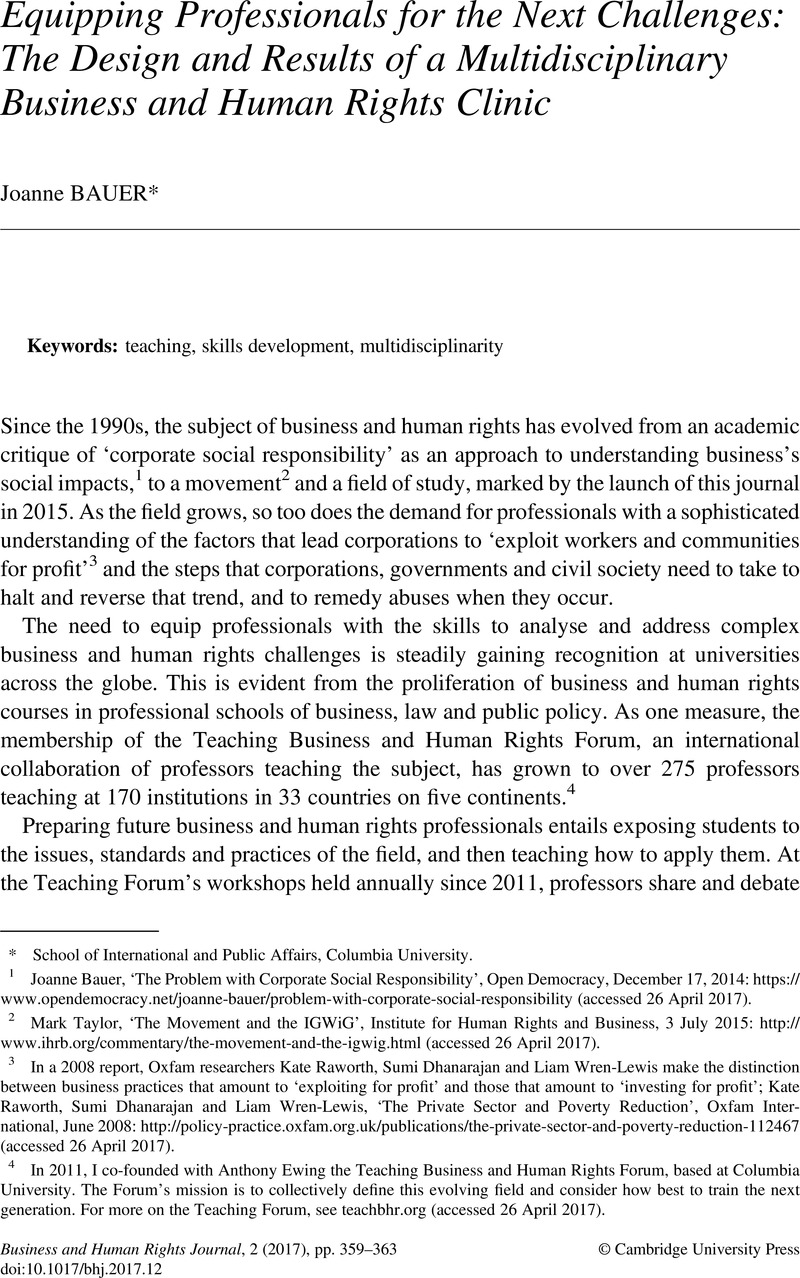Published online by Cambridge University Press: 23 June 2017

School of International and Public Affairs, Columbia University.
1 Joanne Bauer, ‘The Problem with Corporate Social Responsibility’, Open Democracy, December 17, 2014: https://www.opendemocracy.net/joanne-bauer/problem-with-corporate-social-responsibility (accessed 26 April 2017).
2 Mark Taylor, ‘The Movement and the IGWiG’, Institute for Human Rights and Business, 3 July 2015: http://www.ihrb.org/commentary/the-movement-and-the-igwig.html (accessed 26 April 2017).
3 In a 2008 report, Oxfam researchers Kate Raworth, Sumi Dhanarajan and Liam Wren-Lewis make the distinction between business practices that amount to ‘exploiting for profit’ and those that amount to ‘investing for profit’; Kate Raworth, Sumi Dhanarajan and Liam Wren-Lewis, ‘The Private Sector and Poverty Reduction’, Oxfam International, June 2008: http://policy-practice.oxfam.org.uk/publications/the-private-sector-and-poverty-reduction-112467 (accessed 26 April 2017).
4 In 2011, I co-founded with Anthony Ewing the Teaching Business and Human Rights Forum, based at Columbia University. The Forum’s mission is to collectively define this evolving field and consider how best to train the next generation. For more on the Teaching Forum, see teachbhr.org (accessed 26 April 2017).
5 https://sipa.columbia.edu/academics/capstone-workshops/mia_mpa (accessed 26 April 2017).
6 A fourth principle is related directly to the justification of the core curriculum, ‘Recognizing the core as a whole as a central element of the distinctively SIPA education’; ‘MIA and MPA Core Curriculum: Initial Report and Recommendations from Subcommittee on the MIA and MPA Core’, SIPA internal report, Spring 2016.
7 Nine students were surveyed. The survey results were presented at the Fourth Annual UN Forum on Business and Human Rights for a panel on ‘Academics as Multipliers’; see: http://www.ohchr.org/Documents/Issues/Business/ForumSession4/Summaries/CooperationEducationResearchDialogue.pdf (accessed 26 April 2017). Complete survey responses are on file with the author.
8 www.inclusivedevelopment.net (accessed 26 April 2017).
9 International Institute for Environment and Development (UK) and Inclusive Development International, Following the Money: An Advocate’s Guide to Securing Accountability in Agricultural Investments (2015), p. 42.
10 For a five-minute video on investment chain mapping and pressure point identification in the agricultural sector, see: https://www.youtube.com/watch?v=FK15DHzfDmc (accessed 26 April 2017).
11 SIPA Business and Human Rights Clinic Final Report, June 2016 (on file with the Clinic).
To send this article to your Kindle, first ensure no-reply@cambridge.org is added to your Approved Personal Document E-mail List under your Personal Document Settings on the Manage Your Content and Devices page of your Amazon account. Then enter the ‘name’ part of your Kindle email address below. Find out more about sending to your Kindle. Find out more about saving to your Kindle.
Note you can select to save to either the @free.kindle.com or @kindle.com variations. ‘@free.kindle.com’ emails are free but can only be saved to your device when it is connected to wi-fi. ‘@kindle.com’ emails can be delivered even when you are not connected to wi-fi, but note that service fees apply.
Find out more about the Kindle Personal Document Service.
To save this article to your Dropbox account, please select one or more formats and confirm that you agree to abide by our usage policies. If this is the first time you used this feature, you will be asked to authorise Cambridge Core to connect with your Dropbox account. Find out more about saving content to Dropbox.
To save this article to your Google Drive account, please select one or more formats and confirm that you agree to abide by our usage policies. If this is the first time you used this feature, you will be asked to authorise Cambridge Core to connect with your Google Drive account. Find out more about saving content to Google Drive.